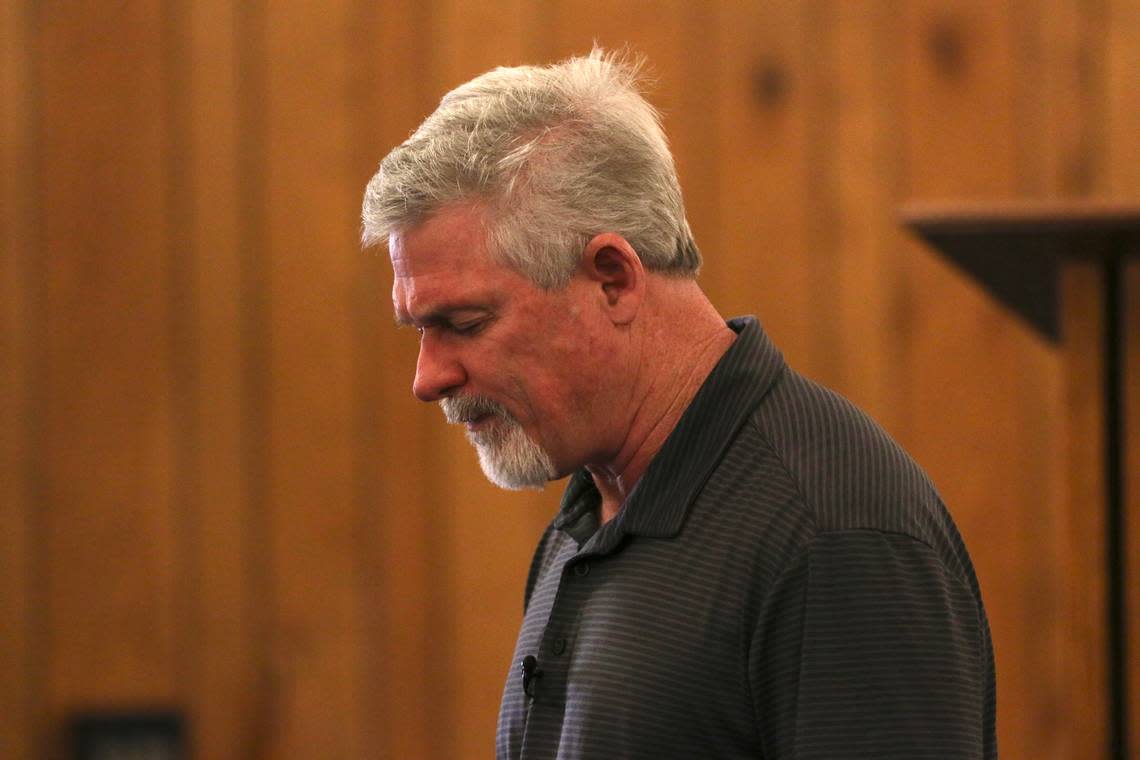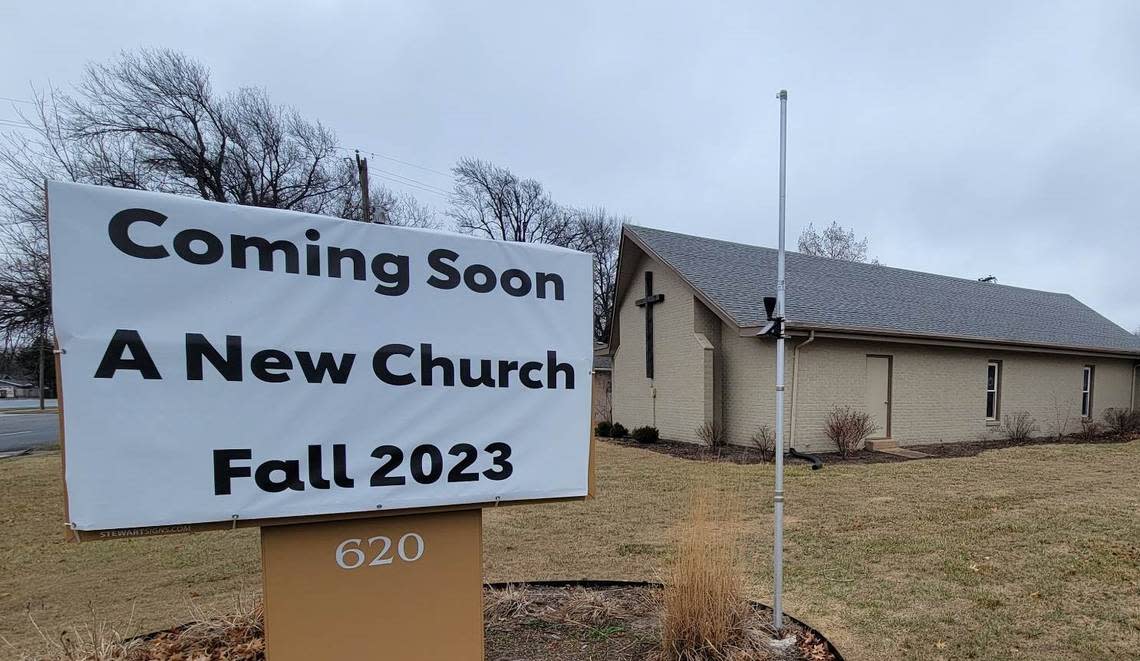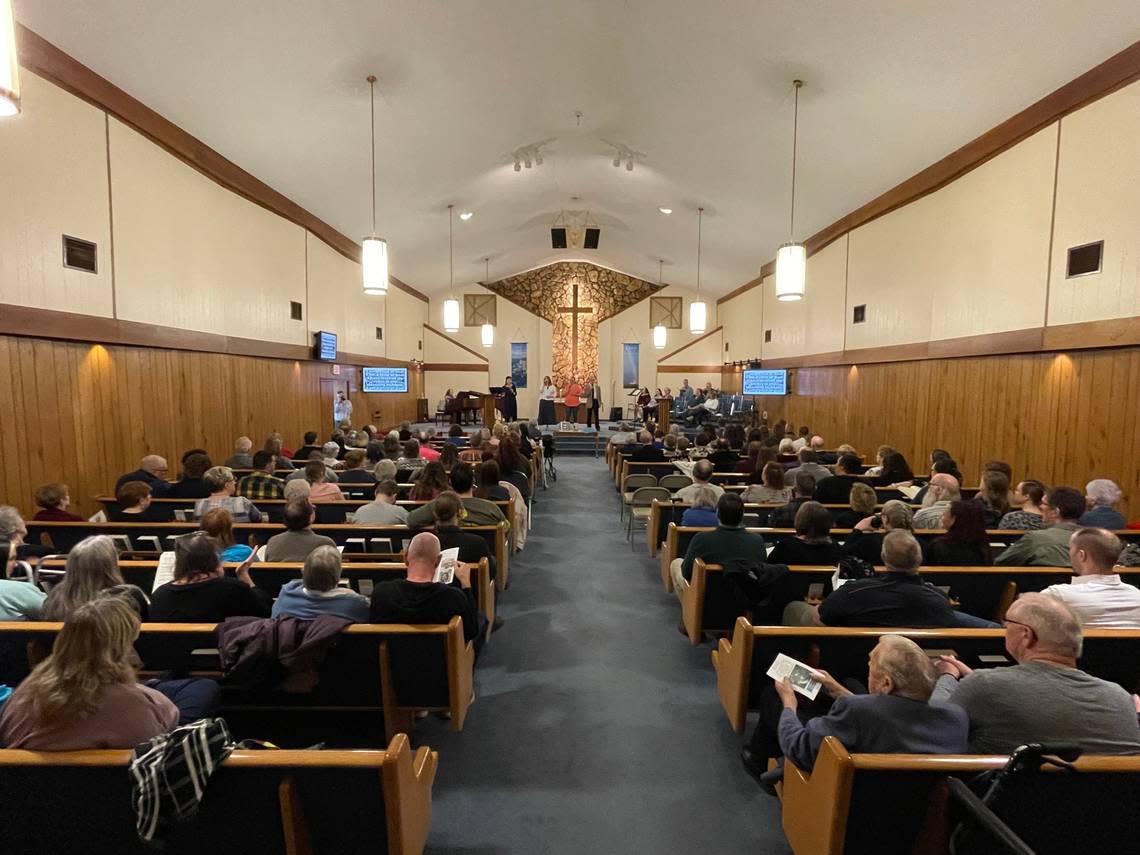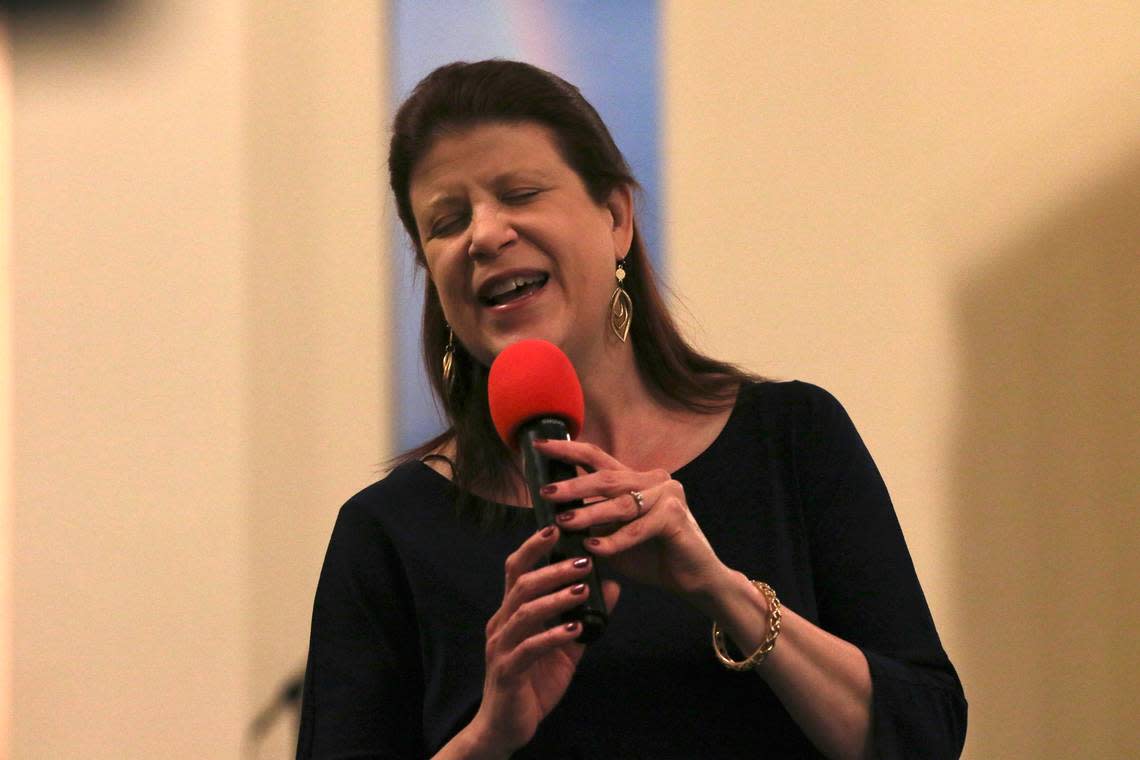Dying church in Wichita takes unique approach to change course, thrive once again
On its last day, the longtime West Side Church of God looked as it had decades ago, with packed pews and a choir nearly 30 strong.
Attendance was more than three times the 45 people on a normal Sunday — close to what it had been in the early 2000s, when Pastor Forest Cornwell joined the church, which sits at 1900 West McCormick, in between Meridian and Seneca.
As at many churches, the number of participants had been dropping for years. Losses during the pandemic ended the choir and other ministries at the 99-year-old church.
So they gathered March 12 to say goodbye.
But what follows the tear-filled service is different for this congregation than for most.
It plans to spend the next several months reinventing itself.
“If we keep going like we’re going as a church, we are going to die,” Cornwell said before the closure. “That might drag out five or 10 years, but we’re not accomplishing anything the way we are going now.”

He added: “Do we keep going like we are going and then one day close the doors, or do we decide not to die and restart?”
West Side’s board all voted to restart by relinquishing their seats and following a road map outlined in a 2018 book, “Dying to Restart,” that is catching on with some congregations.
In a nutshell, the church board will be replaced with pastors and leaders of outside, thriving churches. The church will close for several months, and then reopen with a top-to-bottom operational makeover.
“I’m always amazed because people do not give up control lightly,” book co-author Dan Turner said. “I see this as some Holy Spirit moments that God has prepared hearts to do something really radical.”
It’s one response to combat a national trend of church closures. A Gallup poll dating back to 1937 shows church membership in the U.S. dipped below 50% for the first time in 2020.
“While precise numbers of church closures are elusive, a conservative estimate is that thousands of U.S. churches are closing each year,” the Gallup poll says.
Other studies show thousands of churches open each year, but not nearly enough to offset the closures. The effects of COVID, which led to church shutdowns and many people not coming back when they reopened, are expected to exacerbate the trend.
So far, Turner said, all the churches who follow the book have been successful. Eleven churches have relaunched, with the average growth being about 3.5 times what it was prior to closing, he said.
Going from 15-20 to 60-75 members allows churches to offer more robust services, and the renewed focus is meant to help them make sure the churches are engaging their communities in a way they didn’t before.
By the end of this year, 22 churches will have taken part in the relaunch program. West Side will go through the process alongside First Church of God in Newton.
Those churches will have a new name and a whole new game plan when they reopen in the fall.

Dying to Restart inception
Turner took over as lead pastor of a D.C. church that 32 people regularly attended in 2004. He said he preached his heart out, did everything else he could, but after a year there were still only 32 people.
Then, he heard about the idea of a restart.
There was little information online, he said, and most of what he learned came from a Pennsylvania pastor who shared his experience.
Northwest Community Church, the new name Turner’s church took on, launched in October 2006.
As part of the relaunch, a larger church committed $40,000 over five years, including $6,000 to send about 27,000 postcards to let the community know they were reopening.
The church had a budget of $95,000 at the time, so the postcards would not have been an option without the additional funds. The postcards and the restart worked.
Membership has grown 4% to 5% each year to over 200, he said.
The success turned into Turner sharing his experience and writing “Dying to Restart” with the help of a friend, Greg Wiens.
Turner pastors a church in the same denomination as West Side. But the program has worked for all types of churches.
Mission-minded
Heritage Free Will Baptist Church in Fredericksburg, Virginia, saw its peak of around 200 members in the ‘80s.
They were long past that, and so was the building. The church, which had a rigid dress code and wasn’t mission-minded, didn’t care about spiritually lost people, Pastor Chris Davenport said.
The church relaunched as Bridge Church in March 2020. Attendance has gone from around 15 to about 175.
“‘Dying to Restart’ helped us to refocus on what our mission should be,” he said.
As part of the relaunch, they sold their building at the end of a dead-end block and leased space at an elementary school. When they outgrew that, the church began leasing space at a high school.
Davenport said the book talks about breaking the mindset of, “I lead this and rather it should be this is God’s church and we need to do whatever we can to get people to know Jesus.”
“It works,” he said. “And so when you read that book and follow the guidelines of the book … it worked.”
Bridge Church followed a slightly different road map. Their board was taken over by leadership at one large church of around 2,400 people, instead of multiple churches.
Turner said the point isn’t that you have to grow into one of those large churches to survive, but, oftentimes, churches are dying because they become insular and lose focus on the mission of showing the love and grace of Jesus.
Large churches often have specialized leaders that smaller churches don’t, he said, and having those focused specialties allows them to share a great deal of knowledge with the smaller congregations.
Not all relaunches will look the same, he said, since what works in one community might not in another.
One of the relaunched churches holds normal Sunday church services only half of the month, Turner said. The other half of the month, the church does service projects.

Future of West Side Church of God
Ralph Eaton is the state pastor for the Church of God denomination, which oversees 46 Kansas churches.
Besides the churches in Newton and Wichita, there was a conversation with a Salina church about restarting, but they chose not to, he said. They also are talking to another church about considering a restart.
Churches nationwide, across all denominations, are looking for answers for the drop in membership.
Center for Healthy Churches, a consulting group based in South Carolina, predicts up to 33% of churches could close by 2025, Turner said, adding that is the worst statistic he’s seen. That doesn’t include church startups, but it’s expected there will be a long-term ripple effect from COVID.
“We haven’t seen the hard numbers yet,” he said.
West Side had long been in decline as its members have gotten older.
The church lost some members from deaths, including COVID, and others moved on or didn’t come back after the church closed during gathering restrictions. The losses around COVID put an end to the children’s ministry and led to Sunday school being scaled back.
“COVID really killed most all of our ministry,” Cornwell said.
Members continued to faithfully give during the shutdowns and changes of COVID, so the pandemic didn’t have a financial impact as much as it has at some churches, he said.
But the ongoing struggle showed members that they need help.
The shutdown won’t be six months of relaxing. Members will attend weekly workshops to learn about the changes they need to make.
Leaders from Christ Church and Central Community Church, both in Wichita, and Hope Community Church in Andover have all agreed to be on the church’s new board and commit to helping them succeed. Those churches have from 500 to 1,000 members.
The board commitment is at least for two years, but can be up to three.
Monthly training sessions will also take place for nine months, and additional consulting with Turner and his team will be available. He said the usual fee is $2,200, with the church not paying more than $500 of it and the rest coming from the state and national denomination.
It’s in the interest of the denomination of the church to thrive, so everyone needs to have some skin in the game, Turner said, adding that this isn’t supposed to be a money maker and that he’s waived the fee for churches who couldn’t afford it.
Turner said West Side’s fee was higher, about $1,800 more, because he had to come visit the church and meet with the board in person, which he doesn’t usually do.
Cornwell said the church hired a consultant in the past and paid more for much less work than Turner and his team will be doing.
In addition to the weekly sessions, Cornwell said there are bathrooms that need renovating, a sound system that needs improvements, walls to be painted, and other considerations, such as choosing between sticking with pews or opting for chairs.
“We are going to have plenty to do,” he said. “That’s for sure.”
During the shutdown and after, the church plans to continue offering their food pantry. There’s talk about adding some kind of addiction recovery ministry as well.
But many decisions about the future, including whether the longtime traditional worship in the church should be supplanted with contemporary worship, are still to be decided.
“I know that the heart of the people, they very much want the church to be revitalized,” Cornwell said.
Tracie Nice, the music director, has been going to the church for 55 years, since she was just a few weeks old. She is a fourth-generation congregant, and her family accounts for nearly a third of the weekly attendees. The family includes nieces and nephews who represent the fifth generation of her family at the church.

She would have liked West Side Church of God to make it to a century, but now is the time to act while they still can, she said. Church members know they need to reach and affect the lives of more people to keep the church alive, she said.
“We’re excited, but I’d be lying if I didn’t say it will be real, real difficult too,” she said, adding, “we know in our hearts it’s the right thing.”
The way they reached the community 50 years ago is different than how they need to be today, she said.
Things need to change.
“I have to think that my grandparents, and great-grandparents and those who have gone before, that I’ve loved dearly, I have to think that they’re kind of cheering us on and saying, ‘You didn’t let it die. You’re doing what it takes to keep ministry going even if it’s hard ministering … on that corner where we worked so hard to establish this so many years ago.’”
Nice helped assemble and sing in the last choir under West Side Church of God. They sang “It is Well With my Soul” and traditional Church of God songs — “The Family of God” and “The Church’s Jubilee” — since those songs might not be sung as part of the new worship.
Cornwell was among those struggling to hold back tears. Folks hugged each other a little tighter before leaving.
“The emotions were mixed and there was joy and happiness in seeing so many people,” he said after the service. “We’re saying goodbye to 99 years of history to start something new.”
Contributing: Eduardo Castillo with The Eagle
